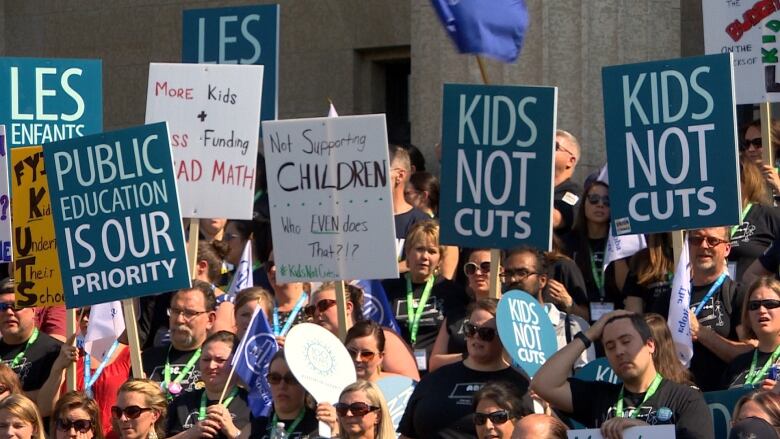When it comes to inclusion for kids with special needs, Manitoba's schools need improvement
Disability Employment Awareness Month a good opportunity to take stock of work we need to do: Joanne Seiff

In my extended family, as in many families, there are both visible disabilities (a kid in a wheelchair) and invisible disabilities, such as autism and ADHD. October is Disability Employment Awareness Month in Manitoba, but it serves as a good reminder that many of us can't just choose to be aware of disabilities once a year.
Making adjustments to cope with disabilities can be a 24/7 reality and it's our obligation, as a society, to take care of our relatives, friends and neighbours and enable them to reach their full potential.
Disability awareness and advocacy matters to everyone, not just those with current visible disabilities. If you hit your head or break a bone, you can become disabled at any time.
How's Manitoba doing when it comes to inclusive policies?
There are still systemic physical inequities in public education, like a lack of handicap-accessible ramps, sidewalk cuts, or public washrooms.That can mean the difference between being able to get around or staying home for people using wheelchairs, scooters, or any kind of adaptive equipment.
Manitoba is woefully behind in addressing these physical barriers to access.
Invisible barriers
Not all obstacles are physical, though. Parents and educators of kids with less-visible disabilities like autism, ADHD and sensory processing disorder look atmany factors when considering whethertheir children can manage in a given situation.
For instance, will that school assembly or event have loud music or crowds with only chaotic, disorganized play? Too much noise, crowds and a lack of structure these things can keep a kid with challenges at home rather than at school with friends.
As part of increasing inclusion, we should examine how the current Winnipeg School Division budget and provincial decisions may affect your child, grandchild, neighbour or friend.

If a kid has a diagnosed disability, the public school will create an individual education plan (IEP) to help best meet that child's needs for an appropriate education. An IEP is legally required under Manitoba legislation for those students.It stipulates what that child is entitled to receive in order to adequately meet their educational needs.
The province's current government has essentially cut overall education spending.
With two kids in public school in Manitoba, I wanted to know more about what that means. A Winnipeg school trustee, school administrators and teachers have indicated to me that special needs education funding has been frozen for the past two years essentially a cut, when inflation is considered.
Manitoba also boosts our population with newcomers and a strong birth rate but those numbers mean our school-age population grows, too. Yet, based on the provincial education budget cuts, we've got a decline in funding to meet the subsequent increases in legally mandated educational needs.
Tough choices for teachers, principals
Further, the province has disconnected funding for educational assistants (EAs) from specific students with disabilities. Instead, they offer schools block grants for assistants.The schools' principals must then decide where best to spend the reduced resources.
One parent told me her child's school of 280 had only three educational assistants, but an additional class desperately needed assistance. The school's guidance counselor was in the classroom helping every day. Is that our best use of resources?
It becomes really difficult for teachers and principals to offer children the fair and appropriate education they are due. No amount of additional tools or teacher tricks replaces an additional adult for those who need one in the classroom.
No matter our (dis)abilities, if we pay taxes, we need reasonable and equal access to the things we pay for in schools.- Joanne Seiff
At the same time, more than one Manitoba educator has told me that in this province, IEPs, though legally required, are not themselves a legal document. In Ontario, in contrast, principals sign forms that state they are "legally required to ensure that the IEP is properly implemented and monitored."
In Manitoba, what happens if a special needs student's IEP is not properly created or executed? What recourse does the special needs student or the student's family have to enable the student's appropriate educational needs will be met?
Disability Awareness Month offers opportunities to discuss the many issues that affect our lives. Manitobans with disabilities and their families face challenges every day. We need to be solutions-oriented.
What are we doing to ensure students with disabilities aren't left out of their classrooms due to a lack of special education support? Who will help kids with IEPs get an appropriate education once the province has cut the educational assistants who support them?
Manitobans with disabilities make great contributions to society.
If we're aware of difference, we must acknowledge, as elementary school students learn, that "everyone has a right." Our province should be committed to equal rights to appropriate education. No matter our (dis)abilities, if we pay taxes, we need reasonable and equal access to the things we pay for in schools.
Including all Manitobans means offering those with disabilities more accommodation and support as time passes, not less.
Cuts to special needs education disable Manitoba's future.
This column is part of CBC's Opinion section. For more information about this section, please read this editor's blog and our FAQ.












_(720p).jpg)


 OFFICIAL HD MUSIC VIDEO.jpg)
.jpg)



























































































